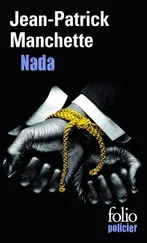Jean-Patrick Manchette - The Mad and the Bad
Здесь есть возможность читать онлайн «Jean-Patrick Manchette - The Mad and the Bad» весь текст электронной книги совершенно бесплатно (целиком полную версию без сокращений). В некоторых случаях можно слушать аудио, скачать через торрент в формате fb2 и присутствует краткое содержание. Год выпуска: 2014, ISBN: 2014, Издательство: New York Review Books, Жанр: Криминальный детектив, на английском языке. Описание произведения, (предисловие) а так же отзывы посетителей доступны на портале библиотеки ЛибКат.
- Название:The Mad and the Bad
- Автор:
- Издательство:New York Review Books
- Жанр:
- Год:2014
- ISBN:9781590177402
- Рейтинг книги:4 / 5. Голосов: 1
-
Избранное:Добавить в избранное
- Отзывы:
-
Ваша оценка:
- 80
- 1
- 2
- 3
- 4
- 5
The Mad and the Bad: краткое содержание, описание и аннотация
Предлагаем к чтению аннотацию, описание, краткое содержание или предисловие (зависит от того, что написал сам автор книги «The Mad and the Bad»). Если вы не нашли необходимую информацию о книге — напишите в комментариях, мы постараемся отыскать её.
The Mad and the Bad — читать онлайн бесплатно полную книгу (весь текст) целиком
Ниже представлен текст книги, разбитый по страницам. Система сохранения места последней прочитанной страницы, позволяет с удобством читать онлайн бесплатно книгу «The Mad and the Bad», без необходимости каждый раз заново искать на чём Вы остановились. Поставьте закладку, и сможете в любой момент перейти на страницу, на которой закончили чтение.
Интервал:
Закладка:
“Congratulations!” said Hartog in a toneless voice. “Is that what they teach at the asylum?”
“It’s not an asylum. It’s an open establishment. I could have left any time I wanted.”
“But you stayed there for five years. Why?”
“You’ve seen my records. You know why.”
4
The Lincoln followed the Seine. Portuguese workers in plastic hard hats were operating jackhammers. Hartog got out a pack of Gitanes and offered one to Julie, who accepted.
“You won’t recognize much. In five years there has been a great deal of construction.”
“So I’ve heard.”
“Are you interested in city planning?”
“Not particularly. What about you?”
“A bit more than that.”
Julie smiled, blowing smoke through her nose.
“I know,” she said, “that you designed the Hartog Foundation building yourself.”
“The Hans-Peter and Marguerite Hartog Foundation.”
“Yes, but people call it the Hartog Foundation.”
“But it’s the Hans-Peter and Marguerite Hartog Foundation.”
“Your brother and his wife.”
The redhead nodded. The corners of his mouth were tense. Shreds of tobacco adhered to his lower lip. His cigarette was damp with saliva.
“You might say,” he added, “that I have made up for my wish for my brother’s death, made up for it by constructing the Foundation.”
“Are you interested in psychoanalysis?”
“No more than you are in city planning.”
The Lincoln crossed the Seine and made its way through Neuilly. On Rue de Longchamp it turned at a building adorned with a plastic fresco. Sliding doors opened automatically as the car approached. It nosed down a cement ramp into an underground garage where two Volkswagen minibuses, a Citroën DS 21, and a Porsche were parked, and pulled into a demarcated slot.
“We’re home,” said Hartog. “This whole building belongs to me.”
The driver got out and went to open Hartog’s door. Julie let herself out on the other side. She saw a broad-shouldered figure emerge from between the DS 21 and a minibus. It was a man in a white raincoat with epaulettes who came up to them with long rapid strides. He held a rolled-up magazine in his left hand.
“You shit! You piece of shit!” he shouted.
The driver of the Lincoln turned briskly and flung himself at the man with fists raised. The other man struck him in the middle of the chest. Stunned, Julie heard the thud. Fists still raised, the driver staggered backward and fell onto the cement, his skull resounding as it hit the ground.
Hartog was getting back into the car. White Raincoat came over and slammed the door against his torso. Hartog let out a cry of pain. The man grabbed him by the collar of his safari jacket, jerked him out of the Lincoln, and threw him to the ground.
“Stop! Stop!” shouted Julie.
The brute paid her no mind, took a run-up, and kicked Hartog in the ribs. Hartog groaned. The blood drained from his face. Julie got back in the Lincoln and opened the compartment with the revolver. She trained the weapon on White Raincoat through the car’s open door.
“Stop or I’ll kill you!” she cried.
The guy looked at her. He had a flat face, a pug nose, and large, very pale gray eyes. On the top of his head the hair was beginning to thin. Yellowish strands lay there limply.
“The safety isn’t even off,” he said.
With a burst of laughter he whacked the revolver with his rolled-up magazine. The Arminius went skittering across the cement. The guy shrugged and made off with his long strides for the exit ramp. Julie quickly retrieved the revolver. She did not know whether to stop the brute or attend to Hartog, who was moaning on the ground. Before she could make up her mind, White Raincoat was past the doors, which closed automatically behind him.
“Help! Somebody help!” called Julie.
The driver struggled uncertainly to his feet, clutching at his stomach.
“Call a doc,” said Hartog. “I have broken ribs, I can feel them. Don’t touch me.”
“The police,” stammered Julie.
She was grinding her teeth from nervousness.
“No. Just my doctor. Quickly!”
Bent double, wracked by nausea, the driver called the doctor on the car’s radio-telephone. Julie, distraught, stayed by Hartog.
“I have to thank you, kid,” said the injured man in a flat voice. “Put the gun away, there’s a good girl.”
“This is dreadful.”
“You haven’t seen anything yet.”
5
The building had five floors. While the doctor was seeing to Hartog, the driver shepherded the young woman through the place. The ground floor and the second floor housed empty offices and conference rooms with thick carpeting and teak furniture. Mondrians on the walls.
The elevator stopped at the third floor and its doors opened, but the driver pressed the button to close them again.
“That’s the boss’s quarters,” he said. “No going in there unless you’re invited.”
The elevator car went up another floor.
“This is where you’ll be staying. We get out here. The top floor is for the snotty brat.”
“Little Peter?”
“Yes. The snotty brat.”
“The whole floor is his?”
The driver nodded.
“The boss will show you. Come and see your room.”
Julie followed the man down a windowless hallway. A white door opened into a room about ten by four meters. Blue carpeting, white walls. A very big window at the far end, overlooking Rue de Longchamp. A Pollock on the left wall, storage units along the right. Cupboards and shelves were covered by a fine-grained white plastic laminate. Likewise the bed, which had a red blanket. There was no bedspread. A white table and a white chair in the middle of the room completed the decor. Which left a good deal of empty space. Julie shivered and crossed her arms. The driver was now in the middle of the room with her suitcase. He turned round.
“My name is André. What’s yours?”
“Julie. Julie Ballanger.”
“Not related to that Communist politician, are you?”
“No, I’m not related to anyone.”
“I’m no longer married myself,” said the driver. “Would you care for a drink?”
He put the suitcase down and went to open a low cabinet. Julie noted an assortment of bottles as well as a record player. The driver noticed her glance.
“For this kind of thing, you can’t say the boss doesn’t do it right. Quite a guy. What are you drinking? Another scotch?”
Julie nodded. The driver handed her the drink. He had poured himself a Ricard. He drank half of it and wiped his mouth with his sleeve.
“Physically, you are far better built than Old Polio.”
“Old Polio?”
“The nursemaid before you. Completely off her rocker. Fifty if she was a day. And an idiot. What about you? What’s your thing?”
“I don’t understand at all,” said Julie. “My thing? What do you mean?”
“The thing that’s screwy with you.”
“I’m cured,” Julie stated.
“The hell you are!” exclaimed the driver. “The boss’s way of doing good is over the top. He only hires retards. He sets up factories for cripples to work in, can you figure that?”
“Not really.”
“Those guys who go around in little motorized wheelchairs? He’s got them working on a production line! In this house it’s the same baloney. The cook is epileptic. The gardener has only one arm, pretty handy for using the shears. His private secretary is blind. His valet suffers from locomotor ataxia-no wonder his meals arrive cold! The snotty brat’s old nanny-well, I told you about her. As for you, you must know yourself.”
“What about you?” asked Julie.
She had taken out a pack of Gauloises and a Criquet lighter. She lit a cigarette and, throwing her head back, blew smoke through her nostrils.
Читать дальшеИнтервал:
Закладка:
Похожие книги на «The Mad and the Bad»
Представляем Вашему вниманию похожие книги на «The Mad and the Bad» списком для выбора. Мы отобрали схожую по названию и смыслу литературу в надежде предоставить читателям больше вариантов отыскать новые, интересные, ещё непрочитанные произведения.
Обсуждение, отзывы о книге «The Mad and the Bad» и просто собственные мнения читателей. Оставьте ваши комментарии, напишите, что Вы думаете о произведении, его смысле или главных героях. Укажите что конкретно понравилось, а что нет, и почему Вы так считаете.












